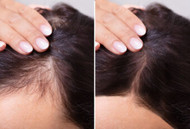What Causes Hair Loss? 10 Common Reasons & What You Can Do
Posted by Xandrox on 26th May 2025
Hair loss can be baffling - one day you're combing through thick, healthy hair, and the next, your comb is full of hair, and you're noticing a receding hairline or bald patches in the mirror. You're not alone. Millions of people worldwide experience hair loss, and while it can be frustrating, understanding the causes puts you in control.
Let's review the 10 most common reasons for hair loss - and what you can do about them.
1. Genetics (Androgenetic Alopecia)
Also called male or female pattern baldness, this is the most common cause of hair loss. It's genetic and tends to progress gradually over the years.
What to do: Medications like minoxidil and finasteride are proven to slow down or even reverse this type of hair loss.
2. Hormonal Changes
Endocrine shifts due to pregnancy, menopause, thyroid gland disease, or birth control pills can lead to temporary or permanent hair loss.
What to do: Treatment of the hormonal imbalance might help. Consult with a healthcare professional for hormone testing and regulation.
3. Stress
Physical or emotional stress may lead hair follicles into their resting phase, causing telogen effluvium, a form of temporary hair loss.
What to do: Engage in stress-reducing activities like exercise, meditation, and sufficient sleep. Hair tends to return once the stressor is eliminated.
4. Nutritional Deficiencies
Lacking iron, vitamin D, biotin, and protein can cause your hair to become weak and result in hair loss.
What to do: Eat a well-balanced, nutrient-dense diet or take supplements under the guidance of a physician.
5. Medical Conditions
Conditions such as alopecia areata, autoimmune disorders, lupus, and scalp infections like ringworm can all cause hair loss. Furthermore,
What to do: Have an early diagnosis made. See a dermatologist or specialist and decide on the best treatment for the disease.
6. Medications
Cancer medications, arthritis medications, depression medications, heart conditions, and high blood pressure medications can all contribute to hair loss as a side effect.
What to do: Talk to your doctor about alternate or supportive treatments to minimize this side effect.
7. Hairstyling & Heat Damage
Tight hairstyles (e.g., braids or ponytails), heat styling, and chemical processing can lead to traction alopecia or breakage.
What to do: Avoid tight hairstyles, minimize heat, and use protective hair products.
8. Aging
As we get older, hair naturally thins and grows more slowly.
What to do: While aging is inevitable, gentle hair care, scalp stimulation, and specific treatments can maintain volume and health.
9. Unhealthy Scalp
An unhealthy scalp that is dry, inflamed, or infected can slow down hair growth and cause hair loss.
What to do: Maintain a clean, moisturized, and exfoliated scalp. Use products specifically designed to enhance scalp health.
10. Excessive Use of Harsh Hair Products
Overuse of chemical-laden shampoos, dyes, and styling products can cause damage over time.
What to do: Use hair products with zero sulfates, parabens, or alcohol. Less is more.
How XANDROX Can Help
At XANDROX.com, we understand firsthand the frustration and emotional toll of hair loss - which is why we offer clinically backed, doctor-formulated treatments to help you regain control.
Our strong topical solutions combine minoxidil (a medically proven hair regrowth drug) with synergistic compounds like azelaic acid, which is capable of blocking DHT - the hormone regularly responsible for genetic hair loss.
Why XANDROX?
- Drugstore-beating advanced formulas
- Targeted treatment through precision application
- Thousands rely on us for tangible, noticeable results
Whether you are just beginning to notice the initial signs of thinning or have been battling hair loss for years, XANDROX is here to assist you in taking the first step towards thicker, fuller hair.

